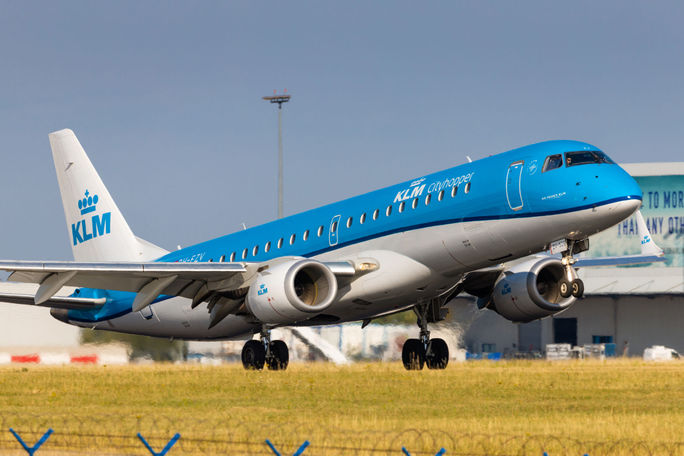KLM Wins Court Case Against Flight Cap at Amsterdam’s Schiphol Airport
[ad_1]
KLM Royal Dutch Airlines has won its bid to prevent Amsterdam Schiphol Airport from reducing flights from 500,000 to 440,000 annually.
Though the airline may have only won a one-year reprieve.
The Court of North Holland ruled today that the state had not followed proper procedures when seeking to reduce the number of flights allowed at Schiphol. As a result of the ruling, the busy airport in the Netherlands may not reduce flights, as it had hoped to do, for the coming year.
The airport has been working to address both noise issues and CO2 emissions. Reducing the number of flights taking place at the airport was part of that effort. The aim was to find a more equitable balance between the interests of aviation and the environment.
Numerous airlines, however, balked at the proposed changes and banded together to bring their complaints to court. The case was brought by the International Air Transport Association (IATA) and the Air Transport Association of America, as well as a long list of airlines. In addition to KLM, other airlines that were a party to the challenge included Delta Air nes, Transavia Airlines, Martinair, TUI Fly (Netherlands), easyJet, Lufthansa, Air Canada, British Airways, JetBlue Airways, United Airlines, and others.
Schiphol’s plan was to roll out a temporary arrangement as of November 2023 that would be in place through October 2024, which would reduce flights to 460,000 annually.
The publication Ch-Aviation, however, reported that KLM and the other airlines argued that they should be able to maintain current capacity of 500,000 flights until the new maximum is in place. Furthermore, the airlines say they should be consulted about changes and that government officials in the Netherlands did not follow the law when rolling out the proposed changes.
For its part, IATA issued a statement today praising the court’s decision.
“We welcome the judge’s decision. This case has been about upholding the law and international obligations,” said Willie Walsh, IATA’s director general. “The judge has understood that the Dutch government violated it’s obligations in shortcutting processes that would bring scrutiny to its desire to cut flight numbers at Schiphol. This decision gives vital stability for this year to the airlines using Schiphol airport and maintains the choice and connectivity passengers value.”

PHOTO: KLM Cityhopper flight landing in Prague, Czech Republic. (photo via rebius/iStock Editorial/Getty Images Plus)
In its statement, IATA argues that while government can indeed lower the number of flight movements in order to reduce noise, it can only be done after having a careful process that consists of assessing the current noise level, setting a noise goal, and considering alternative measures.
IATA’s statement seemingly dismissed or sought to minimize the airport’s goals of also addressing CO2 emissions driving climate change with the flight cuts.
“Local air quality and some greenhouse gas emissions…have also been listed as ‘concerns’ but are not the reason for the cut,” IATA said in its statement.
Airplanes emit about 100 times more C02 per hour than a shared bus or train ride. Additionally, global aviation is responsible for about 1 billion tons of C02 per year, which is more than the emissions of most countries, according to research.
Dutch officials announced in March that they wanted to limit the number of international flights leaving Amsterdam’s Schiphol Airport in order to help address the climate change crisis. Government
officials in the country said at the time that restrictions
would be imposed on all international flights leaving the Netherlands,
in order to cut carbon emissions and help achieve climate goals.
Just this week, further changes were announced including stopping all night flights by the end of 2025. Additionally, the airport said “private
jets and the noisiest aircraft will no longer be welcome.” Combined,
the proposed changes were expected to lead to a substantial reduction in the
noise nuisance caused by the airport.
“Schiphol connects the Netherlands with the rest of the world. We
want to keep doing that, but we must do it better,” Ruud Song, CEO of
Royal Schiphol Group, said in a statement when announcing the most recent proposed changes.
Song
said the only way forward is to become a quieter, cleaner airport and
to do so quickly.
For the latest travel news, updates and deals, subscribe to the daily TravelPulse newsletter.
Topics From This Article to Explore
[ad_2]











